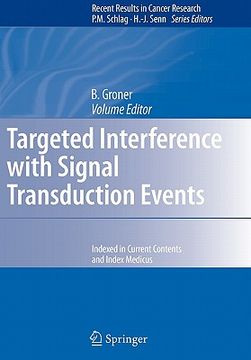Share
targeted interference with signal transduction events
B. Groner
(Illustrated by)
·
Springer
· Paperback
targeted interference with signal transduction events - Groner, B.
£ 141.42
£ 157.13
You save: £ 15.71
Choose the list to add your product or create one New List
✓ Product added successfully to the Wishlist.
Go to My WishlistsIt will be shipped from our warehouse between
Tuesday, June 18 and
Wednesday, June 19.
You will receive it anywhere in United Kingdom between 1 and 3 business days after shipment.
Synopsis "targeted interference with signal transduction events"
Two aspects of biological research are major contributors to the progress in the understanding of cancer etiology and the development of new and improved cancer drugs. The sequencing of the human genome provides us with a basic overview of all our genes and gene products, and the insights into signaling pathways allow us to align crucial components of cellular regulation into an ordered functional context. A comparison of the genes in normal and in tumor cells shows that mutations in the DNA of a limited set of genes are responsible for the multiple stages of tumorigenesis and metastasis. Many of the affected genes, including oncogenes, tumor suppressor genes and genome stability genes, can be fitted into pathways. They encode molecules that stimulate tumor cell division or inhibit their death. Matching of therapeutic intervention with insights into the underlying molecular disease mechanism has already led to the development of drugs such as Herceptin and Glivec. The deregulation of pathways as a consequence of the altered biochemical function of mutated cancer genes provides the conceptual basis for future progress. Will it be possible to extrapolate this principle and derive more efficient drugs targeting cancer pathway components? Promising cell surface molecules, potential targets of monoclonal antibodies, and intracellular molecules with enzymatic activity, potential targets for low-molecular-weight synthetic inhibitors, have been identified. Our ability to predict the consequences of inhibition of such components, however, is still limited. For this reason, the development of targeted drugs remains a complex process, comprising rational and empirical elements. The state of development of tomorrow's cancer drugs, directed against growth factors, growth factor receptors and intracellular signaling molecules with kinase activities, is described in this book.
- 0% (0)
- 0% (0)
- 0% (0)
- 0% (0)
- 0% (0)
All books in our catalog are Original.
The book is written in English.
The binding of this edition is Paperback.
✓ Producto agregado correctamente al carro, Ir a Pagar.

